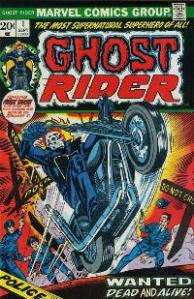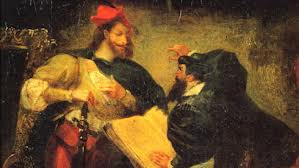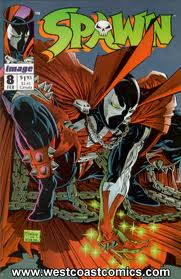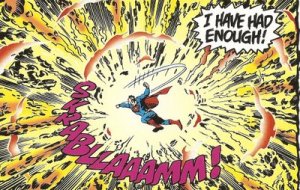I started reading comics as a kid at a particularly satanic moment. Not only had vampires and werewolves crashed through the gatekeeping Comic Code, but the literal Son of Satan demanded his own title in 1973. My favorite supernatural superhero though was the demonic motorcyclist Ghost Rider. Marvel writer Gary Friedrich said the flaming skull idea was his. In fact, Friedrich said the whole character was and sued a few weeks after Columbia released their first Ghost Rider movie (it barely broke even, so I’m still confused how Nicholas Cage managed a sequel). In the comic, Friedrich wrote about the Evel Knievel-inspired Johnny Blaze signing away rights to his soul to save his adoptive father from cancer. A U.S. District Judge wrote in her court opinion that Friedrich had signed his rights away to Marvel.
It’s a diabolically common comic book plot, dating back to Jerry Siegel and Joe Shuster signing DC-owner Harry Donnenfeld’s standard contract and handing their mobster boss Superman for $130. But that wasn’t the first superhero deal with the devil.
When Mephistopheles offered to be Faust’s “servant,” the wizened scholar wisely asked “how must I thy services repay?” demanding “the condition plainly be exprest!” In exchange for his soul (“under-signest merely with a drop of blood”), Faust wanted superhuman knowledge. He’d exhausted all human study—philosophy, medicine, jurisprudence, theology—but was “no nearer to the infinite.” Goethe introduces him alone in his study, moments before conjuring his first spirit:
Therefore myself to magic I give,
In hope, through spirit-voice and might,
Secrets now veiled to bring to light,
That I no more, with aching brow,
Need speak of what I nothing know;
That I the force may recognise
That binds creation’s inmost energies;
Her vital powers, her embryo seeds survey,
And fling the trade in empty words away.
Goethe published the first half of his dramatic poem Faust in 1808, based on the German alchemist Johann Georg Faust who supposedly died in a laboratory explosion when the devil came to collect him personally (the German Church had said the two were in league). An anonymous historian included their actual contract, complete with its legalistic “whereas” and “whereof” jargon, in the first 1587 compilation of the legend. Christopher Marlowe introduced the doctor to English audiences two decades later, but I prefer Goethe’s version. His Faust is the first superman. One of the spirits he conjures asks: “What vexes you, oh Ubermensch!”
Friedrich Nietzsche famously adopted the term, but only after reading Lord Byron’s dramatic poem Manfred while still in school. Young Friedrich called Byron’s Faustian knock-off an “Ubermensch who commands the spirits” and felt “profoundly related to this work,” preferring it over Goethe’s. Byron first heard Faust the summer the Shelleys visited his Geneva manor. Mary Shelley began Frankenstein that same visit, and her mad scientist, like Byron’s mad magician, inherited Faust’s “ardent mind,/ Which unrestrain’d still presses on for ever.” All three o’erleapt the human sphere to know what “Doth for the Deity alone subsist!”
I teach playwriting, so if either poet showed up in class, we’d have to have a very long discussion about the word “dramatic.” Though equally unstageable, Manfred is Faust minus Mephistopheles, a subtraction that probably won over the impressionable Nietzsche. Manfred doesn’t barter his soul to anyone but his diabolical self. His powers were “purchased by no compact” but “by superior science,” “strength of mind,” and a whole lotta “daring.” He accepts his approaching death, but defies “The Power which summons me,” refusing “to render up my soul to” the demonic spirit he orders “Back to thy hell! Thou hast no power upon me.”
Thou didst not tempt me, and thou couldst not tempt me;
I have not been thy dupe, nor am thy prey—
But was my own destroyer, and will be
My own hereafter
The abbot at Manfred’s side urges him to pray for salvation, but Manfred will have none of that either, content to “die as I have lived—alone.” His soul takes its earthless flight, whither the abbot dreads to think. He means Hell, which is where Marlowe sent his Faust in the last act of his tragedy, dragged down like Don Giovanni by the Commandatore’s statue. But the first part of Goethe’s trajedie ends with the repentant Faust’s arrival in Heaven—another reason for Nietzsche to prefer Byron’s ubermensch.
After Manfred, Byron started composing his satiric epic Don Juan, leaping from a damned alchemist named John to a damned womanizer named John. George Bernard Shaw landed in Byron’s footsteps when he modernized Don Juan as an aristocratic eugenicist in his 1903 play Man and Superman—the first time Nietzsche’s “ubermensch” is translated “superman.” Shaw’s John, however, never signs his soul away, just his life when in his last act he submits to marriage—an institution he’d opposed as an obstacle to breeding supermen. He wants to populate the planet with a race of goodlooking philosopher-athletes.
Goethe’s Faust could have demanded invulnerability and super-strength, but his superpowers seem more noble:
The scope of all my powers henceforth be this,
To bare my breast to every pang,—to know
In my heart’s core all human weal and woe,
To grasp in thought the lofty and the deep,
Men’s various fortunes on my breast to heap,
And thus to theirs dilate my individual mind,
And share at length with them the shipwreck of mankind.
Compare that to one of the more recent soul-selling superheroes, Todd McFarlane’s Spawn. When the former CIA assassin died, he made a deal with a demon to see his wife again—and next thing he’s sporting a necroplasmic body with superhuman strength and infinite regenerative powers. He battles angels, demons, and a range of human thugs—but not publishers. McFarlane was one of a group of artists who rebelled against Marvel’s “work for hire” requirement that employees give up all ownership rights—a policy they reversed when they formed Image Comics in 1992. Spawn was one of the company’s first titles.
I applaud their business practices, but when I picked up Spawn No. 8 from a magazine shelf in my local bookstore, I was horrified. It seemed my favorite writer, Alan Moore, had sold not his soul but his signature intelligence when penning the script. But I’m still glad it sold well, and even spawned a movie that grossed more than Ghost Rider. Meanwhile, Siegel, Shuster, and their heirs have spent decades battling the Mephistophelean DC. Their lawsuits kept the Hollywood Superman in Development Hell for a few years—a 2008 judge almost stripped DC of the copyright—but Warner Bros’ lawyer minions always win in appeals. Marlowe sent his Faust shrieking into Hell, but maybe someday the spirits of the U.S. court system will answer his final prayer:
Let Faustus live in hell a thousand years,
A hundred thousand, and at last be sav’d!




Another interesting comics variation on this theme was DC’s Stalker, by Paul Levitz, Steve Ditko and Wallace Wood (absolutely stunning art.)
Nerd moment: Golden Age Superman putting down the Anti-Monitor is one of the bright spots of Crisis. Thank you for reprinting that panel.
Back to less nerdy discussions.
Ah, what is life but a series of nerdy moments?
Alex, I think Timely’s original 1940s Black Widow falls under this category too.
Chris, I always hate admitting ignorance to the erudite HU audience, but my knowledge of these works and the connections between them was skeletal compared to yours. Thanks for closing the gap a little. It was not only interesting, but a fun read.
There was a manga in the late 00s about Robert Johnson, who sold his soul for guitar superpowers.
John: “skeletal,” good word choice!
Jones, there’s a Robert Johnson BD out her in France this week. And R.Crumb retold the story of Johnson and the Devil at the crossroads in his bio-short on Patton (the bluesman.)
The difference between Siegel and Shuster’s Superman and Friedrich’s Ghost Rider is pretty big.
In the case of S & S, they were relatively wide-eyed newbies whose brainchild had been rejected by so many publishers, when they finally did get a nibble to publish, they jumped at it. At that point in time, I’m sure they were happy to get anything for the character,
In Friedrich’s case however, prior to Ghost Rider he’d been in the business for eight years, and a Marvel staffer for six. So he was no babe in the woods. He knew exactly what the deal was. He also was well aware of the S & S situation, so if he had any qualms about “selling his soul to the devil,” it certainly didn’t keep him from giving “The House of Ideas” new ideas.
And let’s be totally honest here about many of Marvel’s “new” ideas during the 1970s. They were cranking out so much stuff compared to the 1960s, creators at both DC and Marvel were simply borrowing previous concepts from films, pulps and old comics, giving them a twist, mashing two or more of them together, adding a different look, and then cranking them out as a new character, comic or story. I certainly didn’t think the new Ghost Rider was all that innovative when it was published. I just liked Ploog’s art! In fact, when Ploog left the book, I stopped buying it.
I agree, but would still hold that the absurd industry norm of “work for hire” was the same in 30s and it was in the 70s, and though Friedrich was more experienced and perhaps less creative than S&S, he was still working within an unreasonable system. Which is why I was disappointed that the Supreme Court didn’t get to rule on Kirby’s case. There was a chance the whole industry was going to be radically revised toward creator rights.
“There was a chance the whole industry was going to be radically revised toward creator rights”
Well, that’s the theory about why Marvel wanted to settle, right?
Chris — I don’t want to be too brutal here, but no one twisted Friedrich’s arm to be in the comics biz as it existed during the Silver and Bronze Age. Like all of us at the time, Friedrich new the deal when it came to creating stuff for the Bigs. One of the reasons I walked away from a career in comics was because I knew if I wanted to play with other people’s toys, I had to follow their rules. And if I created new toys for their toy box, I wouldn’t own them — just like S & S, Friedrich, or anyone else. Couple that with the non-existent benefits compared to my 1970s union job, and it was clear to me that the freelancer comic book life was not for me.
Friedrich (and others) could have walked away as well, but he opted not to. That was his conscious choice.
Faust’s choice was conscious too. Mephisto, like Marvel and DC, didn’t have to twist arms. Their toys were just so damn appealing. The fact that you didn’t sign your creativity away (and I am impressed by your choice) doesn’t make Marvel less culpable for holding out a blood-dipped pen to you and everybody else lured into their circle. Avoiding that culpability is why Marvel settled with Kirby’s heirs for eight figures.
Chris — Prior to the direct market, the comics publishing biz was expensive up front, and brutally unforgiving in that for every cash cow there were a hundred failures.
That’s why, even though many in the early comics biz were thinly veiled crooks, I generally sympathize with them and their business models somewhat because the publishing trail was riddled with ghosts of hundreds of failed publishers.
Some of those “ghosts” were actual comics creators who borrowed money, used their life’s savings, took a second mortgage on their houses, and/or hocked everything to gin up the cash necessary to start their own company. And, until the advent of the direct market, every creator-owned comic book company failed — most before the first year was out.
Friedrich could have taken the risks, but he opted to stay under the protective cover of an established company. That, in my opinion, makes his later protestations ring quite hollow.
And let’s be honest here. If Friedrich had self-published his idea in 1973, do you think that without Marvel’s fan base, creative support team, distribution system and character name, anyone today would have the faintest idea who Johnny Blaze is?
Not only no, but Hell no (pun intended).